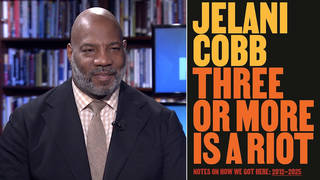
Topics
By Amy Goodman & Denis Moynihan
In the quaint tourist town of Harbert, Michigan sits an unassuming restaurant that has been owned and operated by a man who is considered a pillar of his community. Cafe Gulistan is owned by Ibrahim Parlak. He is, by almost all appearances, a classic example of the immigrant success story. There is just one problem: The U.S. government is trying to deport him to Turkey, where he has a well-founded fear of imprisonment, torture and possibly death. After a quarter of a century here in the United States, he now has about 75 days left to fight deportation.
Parlak is Kurdish, born in the region of Turkey called Anatolia, in 1962. His childhood was marred by increasing government repression of Turkey’s Kurdish ethnic minority. Turkey banned the Kurdish language, Kurdish cultural expression, and attempted to forcibly assimilate the Kurdish people to destroy their heritage. Resistance to that assimilation included protests and grass-roots organizing, but also, by the 1980s, armed resistance from the Kurdistan Workers’ Party, or PKK. In the late 1970s, Parlak, as a teenager, was jailed for three months for engaging in peaceful protests. He then moved to Germany to avoid further repression from the Turkish government. He remained active in the movement for Kurdish autonomy, hosting cultural events and raising funds for the political, nonmilitary wing of the PKK, known as the National Front for the Liberation of Kurdistan. After seven years in Germany, Parlak decided he could better support the Kurdish cause back home.
He decided to cross back into his Kurdish homeland, he said, to “[g]o back to people, go to my family, go back where I [was] born and where I grow up, just reunite with my own.” Turkey had revoked his passport, so he decided to sneak into the Kurdish region of Turkey directly from Syria. As the group he was with was crossing the border, they were fired on. In the ensuing firefight, two Turkish soldiers were killed. Months later, he was arrested by Turkish authorities and charged with “separatism,” although he was never charged with killing the two soldiers. Turkish authorities confirm that he did not shoot that night.
“I was captured and put in jail, for a month, mistreated, tortured. And it’s just-you know, it’s not a memory you want to revisit,” Ibrahim Parlak told us on the “Democracy Now!” news hour. It visibly pains him to recall the experience. A description that appears in a federal appeals court filing here in the U.S. from 2007 is chilling: “the Turkish gendarme shocked him with electrodes, beat his genitalia, hung him by the arms, blindfolded him and deprived him of sleep, food, water and clothing, and anally raped him with a truncheon over the course of almost a month.” Ultimately, he was imprisoned for close to a year and a half.
Parlak eventually fled to the United States, where he received asylum and began the long process of building a life. He received his green card, and in 1999 applied for citizenship. By this time, the PKK had been designated a terrorist organization by the US State Department, so the mention of the group in his file delayed his application. After Sept. 11, 2001, the process for gaining citizenship transformed. Eager bureaucrats from the newly minted Department of Homeland Security were looking for terrorists in mosques, parks, schools, you name it. Ibrahim Parlak fit their bill just fine, and the American dream he had built came crashing down.
He was arrested and jailed while awaiting deportation. Community support for Parlak was incredible. A former FBI counterterrorism lawyer volunteered to represent him. People he had worked with for years and even local police testified to his character. After 10 months in a county jail, a federal judge ordered his release, stating, “He has been a model immigrant. … He is not a threat to anyone nor a risk of flight. He has strong ties to the community.”
Since then, he has been on “deferred action” for deportation, meaning he can be grabbed at any time and deported to Turkey. He has support from Republican Congressman Fred Upton, and had the support of Sen. Carl Levin, Democrat of Michigan, until Levin retired last year. His supporters are asking Sens. Debbie Stabenow and Gary Peters, both Democrats, to file a bill protecting Parlak, but to date, neither has. The dean of the University of Chicago Law School has asked for President Barack Obama to pardon Parlak.
Turkey, meanwhile, has escalated its military assault on the Kurds, and has imposed harsh curfews and intense censorship of any dissent. Many are concerned of the grave danger that Parlak faces if he is deported to Turkey. His lawyer, Rob Carpenter, told us that Parlak has received “private Facebook threats of modes of torture that were never made public before, indicating it must be one of several guards who tortured him during those seventeen months before he fled to the United States.”
Ibrahim Parlak is back at his Cafe Gulistan, his future uncertain. The U.S. government contends he is a terrorist, although he has never been found guilty of committing a violent act. Deporting him, however, would be an act of terror in itself.
Amy Goodman is the host of “Democracy Now!,” a daily international TV/radio news hour airing on more than 1,300 stations. She is the co-author, with Denis Moynihan, of “The Silenced Majority,” a New York Times best-seller.
(c) 2015 Amy Goodman
Distributed by King Features Syndicate











Media Options